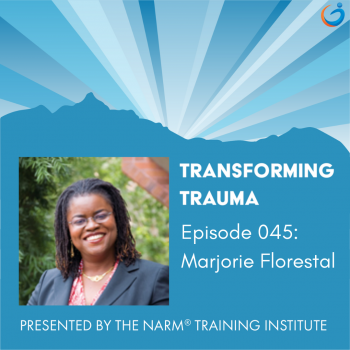Transforming Trauma Episode 045: Trauma-Informed Law and Storytelling with Marjorie Florestal
A podcast brought to you by the NARM® Training Institute
On this episode of Transforming Trauma, our host Sarah Buino is joined by Marjorie Florestal. Marjorie is a trauma-informed law professor, storyteller, and fiction writer. Marjorie trained in the NeuroAffective Relational Model (NARM) and shares how she is incorporating her understanding of complex trauma and NARM into her work as a law professor. Throughout the episode, Sarah and Marjorie discuss the integration of trauma, law, storytelling, and ways to support healing through a trauma-informed lens.
Marjorie describes her journey from studying law, working as an international trade lawyer, to becoming trauma-informed. Her journey was fueled by curiosity about her own trauma. “[At first,] I wanted to get as far away from the emotions as I could possibly get”, she says. While serving as a trade lawyer for the Clinton administration, she realized how much emotions play into negotiations. She decided to become a law professor as a way to still be in the field without having to deal with emotions – that is, until she was impacted by a student who was tearful in her classroom. “After the student left, I thought, oh, something has to change within me.” She realized she was ready to learn more about her relationship to her profession, as well as herself. This led her to study psychology.
While still a law professor, Marjorie completed a Masters’ degree in Jungian Psychology where she met Brad Kammer, NARM Senior Faculty. Marjorie shares how she was greatly impacted by Brad’s teaching, not only professionally but also personally. She followed her intuition that learning the NeuroAffective Relational Model would somehow benefit her in better supporting her law students.
Marjorie and Sarah discuss the struggles many law students have with their mental health, specifically in their last year of school. Marjorie states, “40% of our students are clinically depressed and then it just snowballs from there into the profession.” Marjorie shares that she is currently writing her dissertation on the intersection of learning law and complex trauma. “There is some aspect of trauma going on, and there’s also some aspect of a kind of a developmental stage going on.” She postulates that students’ ongoing struggles with mental health come from the convergence of the trauma and the developmental stages they’re experiencing. She further explains that law school is highly stressful and when students have been taught that there is no place for emotions, it can result in high levels of anxiety and depression.
Marjorie excitedly shares with Sarah that she plans to utilize what she’s learned in her NARM training and incorporate that into her class that she’s developing called “Trauma-Informed Lawyering”. Marjorie hopes that if we can help law students with trauma, we can change the culture of the whole profession.
Sarah inquires more about how Marjorie plans to use NARM in her classroom. Marjorie shares that what NARM has helped her and her students with most is slowing down. She explains that when she supports her students to slow down, they can then notice their own internal experience. Marjorie shares that what most often comes up for students when they slow down is their struggle to trust. When students are moving fast and hyper focused on the context of the negotiation, they are less likely to be able to access their own internal awareness. By slowing down, the students support their connection to themselves. She acknowledges how impactful this is on their wellbeing, and their work.
Marjorie and Sarah also explore how the trauma-informed movement can be a way to raise awareness around vicarious trauma for lawyers. She shares with Sarah that those who are involved in the courts are often forced to see pictures or hear stories that are more harmful than helpful to a case or a negotiation. Marjories believes the more we can understand the impact of trauma, these practices will change and become trauma-informed. Marjorie then introduces Sarah and listeners to the notion of therapeutic jurisprudence. Which she defines as, “an approach to law that seeks to use law as a healing modality.” She further explains that this is a way of empowering judges to come up with solutions that aren’t about punishment and instead rehabilitation, such as offering assistance for addiction rather than jail.
Marjorie also shares her experience as being a woman of color in teaching law, and how she relates to the current state of criminal justice in the United States. She shares, “as a black woman I could not fathom being part of a system that wholesale channels people of color into cages.” Marjorie recently facilitated an hour-long session at her law school looking at racial trauma and the healing potential of myths and stories.
This episode concludes with Marjorie sharing a beautiful story called, The Stolen Mother Moon. She expresses that she has a personal connection to the story due to the loss of her mother when she was nine. She relates this story to collective trauma, symbolic of the stolen mothers from Africa who were abused and enslaved yet they persevered and demanded justice. She states, “there will always be darkness, and we can see that darkness as an opportunity for more work to be done.”

Subscribe for All Episodes
on your Favorite Service:
We want to connect with you!
Facebook @NARMtraining
Twitter @NARMtraining
YouTube
Instagram @thenarmtraininginstitute
Learn more about The NARM Training Institute: http://www.narmtraining.com
Sign up for a free preview of The NARM Inner Circle Online Membership Program: http://www.narmtraining.com/freetrial
About Marjorie :
Marjorie works with universities and mission-driven corporations to design and implement a compelling vision for the future. As a former tenured law professor and litigator, Marjorie has over twenty years of experience in the art of storytelling, persuasion, research, writing, teaching, and public speaking. She combines that experience with a deep understanding of the psychological power of story and a passion for the craft.
Website: www.marjorieflorestal.com